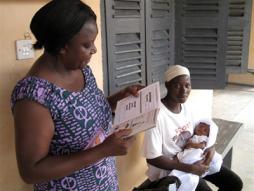community health
Posted by AnneryanHeatwole on Apr 09, 2012
In Zambia, roughly 13.5% of the population is estimated to have HIV/AIDS, while the number of children (ages 0-14) with the disease is estimated to be 120,000. Programme Mwana uses SMS technology to send lab results between community health clinics and diagnostic labs to improve the process of early infant diagnosis across the country.
Launched in 2010 through a partnership with UNICEF Innovation, the Zambian Ministry of Health, Boston Univeristy, CHAI, and the local UNICEF office, Programme Mwana was designed to be a scalable system to help with infant health interventions, allowing HIV/AIDS results to be sent securely from labs to district clinics. The project was launched simultaneously in Malawi. Merrick Schaefer, who led the development of the project with UNICEF, says that the group focused on participatory design to develop agile, adaptable software that meets the needs of community health workers.
| Designed to Scale: How Programme Mwana Uses SMS to Get Health Results Across Zambia and Malawi data sheet 2185 Views |
| Countries: |
Zambia
|
Posted by EKStallings on Oct 26, 2011
Mobile Phone-based Infectious Disease Surveillance System, Sri Lanka data sheet 1000 Views
Author:
Robertson, Colin, Kate Sawford, Samson L.A. Daniel, Trisalyn A. Nelson, Craig Stephen
Abstract:
Because many infectious diseases are emerging in animals in low-income and middle-income countries, surveillance of animal health in these areas may be needed for forecasting disease risks to humans.
We present an overview of a mobile phone–based frontline surveillance system developed and implemented in Sri Lanka. Field veterinarians reported animal health information by using mobile phones. Submissions increased steadily over 9 months, with ≈4,000 interactions between field veterinarians and reports on the animal population received by the system.
Development of human resources and increased communication between local stakeholders (groups and persons whose actions are affected by emerging infectious diseases and animal health) were instrumental for successful implementation.
The primary lesson learned was that mobile phone–based surveillance of animal populations is acceptable and feasible in lower-resource settings. However, any system implementation plan must consider the time needed to garner support for novel surveillance methods among users and stakeholders.
Posted by LeighJaschke on Sep 09, 2009
The recently released mHealth Ethnography Report is an important addition to the growing body of knowledge about the potential for community health initiatives supported by mobile technology. As we have noted before, much of the health care in rural communities is provided by community health workers, largely untrained paraprofessionals.
The report hones in on the potential of SMS/text messages and voice services accessible via mobile to reinforce outreach services and support for these community health workers. The authors assess the initial state of information, communication, and mobile phone use for maternal and newborn health in the health sector and the general population in the Dangme West District in the Greater Accra Region.
It indicates that mobile phones are already used by many healthcare workers and by the general population to seek health related information or coordinate related transportation in emergencies.
The study was conducted as a part of the Grameen Foundation initiative to determine how best to use mobile phones to increase the quantity and quality of antenatal and neonatal care in rural Ghana. The Mobile Technology for Community Health (MoTeCH) initiative is a collaboration of Columbia University's Mailman School of Public Health and the Ghana Health Service, funded by a grant from the Bill & Melinda Gates Foundation.

